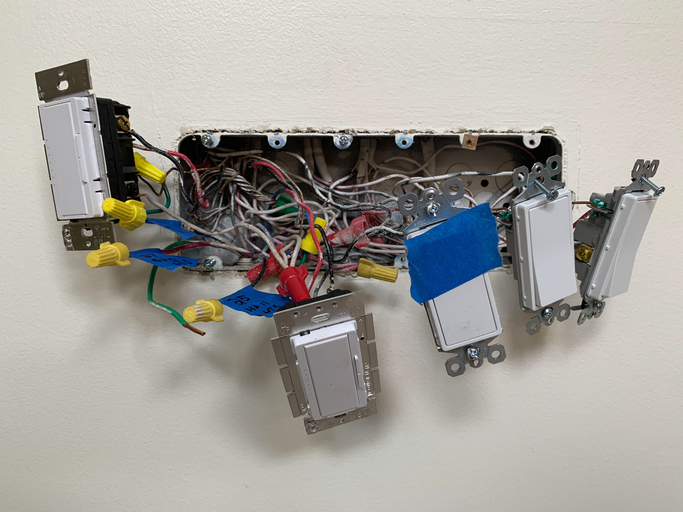Rewiring is a crucial home improvement project that can guarantee the safety and functionality of your electrical system. Whether you’re renovating an older property or upgrading outdated wiring, understanding the cost of electrical rewiring is essential for making an informed decision. Rewiring not only ensures compliance with modern electrical standards but also improves the safety of your home by reducing fire risks, enhancing energy efficiency, and accommodating new electrical demands. This guide will explore the factors that contribute to the overall cost of rewiring, giving you the information needed to plan your project effectively and avoid unexpected expenses.
1. Age and Condition of Existing Wiring
The age and condition of your existing wiring play a significant role in the cost of rewiring. Homes with older electrical systems, especially those built before the 1970s, may require extensive rewiring to meet current electrical codes. Outdated systems, such as knob and tube wiring or aluminum wiring, pose safety hazards and need to be replaced. The more extensive the rewiring needed, the higher the cost. In some cases, the rewiring process can also uncover hidden issues like faulty connections or outdated components, which can add to the overall price. Inspecting the condition of your current wiring before beginning the project will help you better estimate the costs involved.
2. Size of the Home
The size of your home is another major factor influencing the cost of electrical rewiring. Larger homes typically require more materials and labor to rewire, increasing the overall project cost. The number of rooms, electrical outlets, light fixtures, and appliances will all affect the amount of wiring needed. A small apartment or bungalow may have a lower rewiring cost compared to a larger multi-story house, as fewer circuits and wiring will be required. Additionally, if your home has multiple floors or hard-to-reach areas, this can increase labor costs due to the difficulty of installation and the time it takes to complete the job.
3. Electrical Load Requirements
The electrical load requirements of your home are another critical factor in determining the cost of rewiring. As homes become more reliant on electrical devices, such as air conditioners, home offices, and smart appliances, the electrical system needs to support higher loads. Homes with high electrical demands may require an upgrade to the main electrical panel to handle the increased capacity. This could include installing a larger circuit breaker or additional circuits to guarantee the safety and efficiency of your electrical system. The higher the electrical load, the more expensive the rewiring project may be, as it requires additional materials and labor to meet these demands.
4. Permits and Inspections
The project often requires permits and inspections to comply with local building codes and safety regulations. The cost of obtaining permits and scheduling inspections can vary depending on your location and the complexity of the project. Some municipalities may require inspections at different stages of the rewiring process to ensure everything is up to code. In contrast, others may only require a final inspection once the work is complete. These permits and inspections can add to the total cost of your rewiring project, but they are necessary to ensure that the work is safe, compliant, and completed correctly.
5. Materials and Wiring Types
The materials and wiring types used during your rewiring project can significantly impact the overall cost. The cost of wiring can vary depending on the material, with copper wiring being more expensive than aluminum or other alternatives. Additionally, some types of wiring are better suited to specific needs, such as running wiring through walls or underground. Opting for higher-quality materials can increase the cost but also improve the safety and longevity of your electrical system. Electrical outlets, switches, and circuit breakers also contribute to the cost, as their quality and number will depend on the scope of the rewiring job.
6. Labor Costs
Labor costs are one of the largest components of rewiring expenses. The rate charged by electricians can vary depending on your location, the complexity of the job, and the electrician’s experience. It requires licensed professionals to guarantee the job is done safely and up to code. In areas with a high demand for skilled electricians, labor costs may be higher. Additionally, the size of the project and the time required for completion will directly impact labor costs. It’s important to obtain multiple quotes from reputable electricians to compare pricing and guarantee you’re getting fair rates for the work.
7. Potential Hidden Costs
While you can estimate the cost of rewiring based on factors like home size, materials, and labor, it’s important to account for potential hidden costs that may arise during the project. Issues such as discovering outdated wiring, mold or water damage in walls, or problems with the electrical panel may not be apparent until work begins. These issues can add significant costs to the project, as additional repairs or replacements may be necessary. Additionally, if your home requires extensive rewiring or upgrades to meet modern electrical codes, this can lead to unforeseen costs. It’s wise to set aside a contingency budget to cover unexpected expenses that may arise during the project.
8. DIY vs. Professional Rewiring
One option for reducing the cost of this project is to attempt the project yourself (DIY). While this may seem like a cost-saving approach, it’s important to understand that electrical work is complex and requires specialized knowledge. Incorrectly rewired electrical systems can lead to serious safety hazards, such as fires or electrocution. For this reason, it’s highly recommended to hire a licensed electrician for rewiring projects. While professional services may have a higher upfront cost, they guarantee the job is done safely, to code and with long-term reliability. Attempting it yourself could ultimately lead to more expensive repairs and risks.
The cost of electrical rewiring can vary greatly depending on a number of factors, including the size of your home, the condition of the existing wiring, electrical load requirements, and the materials used. Labor costs and permits can add to the expense, while hidden issues discovered during the rewiring process may increase the total cost. Although DIY rewiring may seem like a money-saving option, it’s often better to invest in a professional electrician to ensure the work is done safely and to code. By understanding these factors and properly preparing for the project, you can avoid unexpected expenses and guarantee your electrical system is updated to meet modern standards.
Are you planning to rewire your home? Seek the assistance of a licensed electrician from OutToday Plumbing, Heating & Electrical for a detailed quote. Call us at (425) 615-5000to ensure your electrical system is safe, efficient, and up to code.






